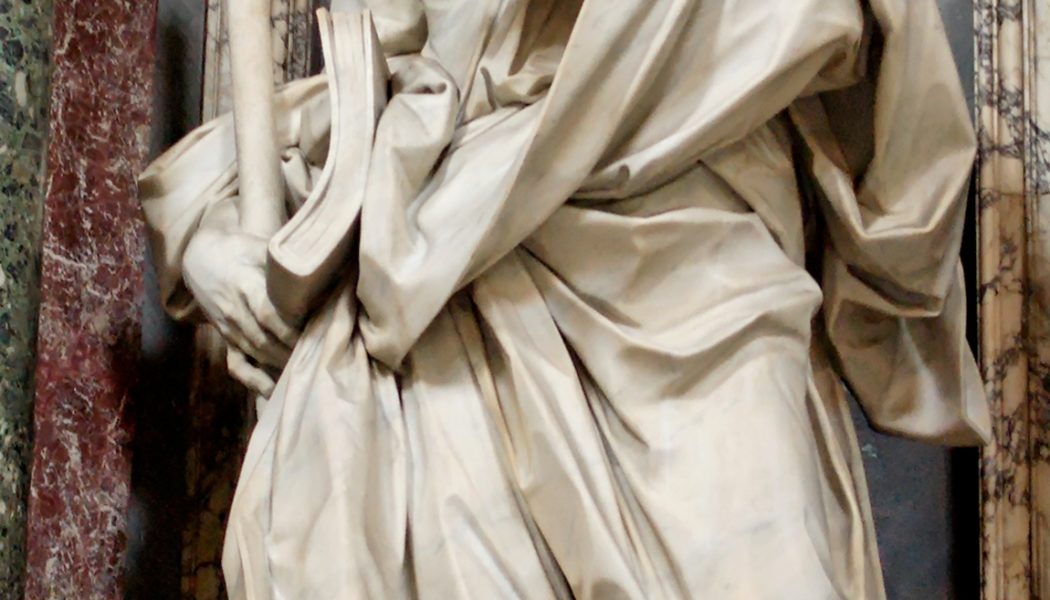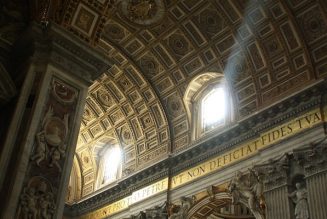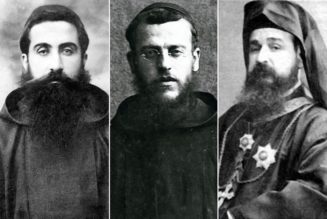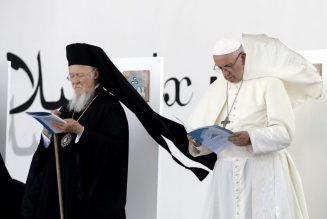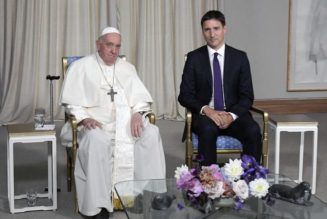We’ll start with the more confusing one – James. As is the case with (in English) “Mary” – there are a lot of “James” in the New Testament narratives, so sorting them out is a challenge. And perhaps not even really possible.
Today’s feast celebrates James “the Lesser” – as opposed to James the Greater, brother of John, one of the first four apostles called by Jesus, present at the Transfiguration, feast June 25, etc.
Thus, St James’ Letter shows us a very concrete and practical Christianity. Faith must be fulfilled in life, above all, in love of neighbour and especially in dedication to the poor. It is against this background that the famous sentence must be read: “As the body apart from the spirit is dead, so faith apart from works is dead” (Jas 2: 26).
“amy welborn”
” data-image-caption data-medium-file=”https://amywelborn.files.wordpress.com/2016/05/jacobus_minor_san_giovanni_in_laterano_2006-09-07.jpg?w=165″ data-large-file=”https://amywelborn.files.wordpress.com/2016/05/jacobus_minor_san_giovanni_in_laterano_2006-09-07.jpg?w=500″ class=” wp-image-19121 alignleft” src=”https://amywelborn.files.wordpress.com/2016/05/jacobus_minor_san_giovanni_in_laterano_2006-09-07.jpg” alt=”"amy welborn"” width=”136″ height=”247″ srcset=”https://amywelborn.files.wordpress.com/2016/05/jacobus_minor_san_giovanni_in_laterano_2006-09-07.jpg?w=136&h=247 136w, https://amywelborn.files.wordpress.com/2016/05/jacobus_minor_san_giovanni_in_laterano_2006-09-07.jpg?w=272&h=494 272w, https://amywelborn.files.wordpress.com/2016/05/jacobus_minor_san_giovanni_in_laterano_2006-09-07.jpg?w=83&h=150 83w, https://amywelborn.files.wordpress.com/2016/05/jacobus_minor_san_giovanni_in_laterano_2006-09-07.jpg?w=165&h=300 165w” sizes=”(max-width: 136px) 100vw, 136px”>
At times, this declaration by St James has been considered as opposed to the affirmations of Paul, who claims that we are justified by God not by virtue of our actions but through our faith (cf. Gal 2: 16; Rom 3: 28). However, if the two apparently contradictory sentences with their different perspectives are correctly interpreted, they actually complete each other.
St Paul is opposed to the pride of man who thinks he does not need the love of God that precedes us; he is opposed to the pride of self-justification without grace, simply given and undeserved.
St James, instead, talks about works as the normal fruit of faith: “Every sound tree bears good fruit, but the bad tree bears evil fruit”, the Lord says (Mt 7: 17). And St James repeats it and says it to us.
Lastly, the Letter of James urges us to abandon ourselves in the hands of God in all that we do: “If the Lord wills” (Jas 4: 15). Thus, he teaches us not to presume to plan our lives autonomously and with self interest, but to make room for the inscrutable will of God, who knows what is truly good for us.
Now, Philip. I think this GA talk really highlight’s B16’s catechetical skills. We don’t know that much about Philip, but Benedict takes what we do know, and hones it down in the most practical…pastoral way:
The Fourth Gospel recounts that after being called by Jesus, Philip meets Nathanael and tells him: “We have found him of whom Moses in the law and also the prophets wrote, Jesus of Nazareth, the son of Joseph” (Jn 1: 45). Philip does not give way to Nathanael’s somewhat sceptical answer (“Can anything good come out of Nazareth?”) and firmly retorts: “Come and see!” (Jn 1: 46).
In his dry but clear response, Philip displays the characteristics of a true witness: he is not satisfied with presenting the proclamation theoretically, but directly challenges the person addressing him by suggesting he have a personal experience of what he has been told.
The same two verbs are used by Jesus when two disciples of John the Baptist approach him to ask him where he is staying. Jesus answers: “Come and see” (cf. Jn 1: 38-39).
We can imagine that Philip is also addressing us with those two verbs that imply personal involvement. He is also saying to us what he said to Nathanael: “Come and see”. The Apostle engages us to become closely acquainted with Jesus.
In fact, friendship, true knowledge of the other person, needs closeness and indeed, to a certain extent, lives on it. Moreover, it should not be forgotten that according to what Mark writes, Jesus chose the Twelve primarily “to be with him” (Mk 3: 14); that is, to share in his life and learn directly from him not only the style of his behaviour, but above all who he really was.

Indeed, only in this way, taking part in his life, could they get to know him and subsequently, proclaim him.
Later, in Paul’s Letter to the Ephesians, one would read that what is important is to “learn Christ” (4: 20): therefore, not only and not so much to listen to his teachings and words as rather to know him in person, that is, his humanity and his divinity, his mystery and his beauty. In fact, he is not only a Teacher but a Friend, indeed, a Brother.
How will we be able to get to know him properly by being distant? Closeness, familiarity and habit make us discover the true identity of Jesus Christ. The Apostle Philip reminds us precisely of this. And thus he invites us to “come” and “see”, that is, to enter into contact by listening, responding and communion of life with Jesus, day by day.
Then, on the occasion of the multiplication of the loaves, he received a request from Jesus as precise as it was surprising: that is, where could they buy bread to satisfy the hunger of all the people who were following him (cf. Jn 6: 5). Then Philip very realistically answered: “Two hundred denarii would not buy enough bread for each of them to get a little” (Jn 6: 7).
Here one can see the practicality and realism of the Apostle who can judge the effective implications of a situation.
We then know how things went. We know that Jesus took the loaves and after giving thanks, distributed them. Thus, he brought about the multiplication of the loaves.
It is interesting, however, that it was to Philip himself that Jesus turned for some preliminary help with solving the problem: this is an obvious sign that he belonged to the close group that surrounded Jesus.
On another occasion very important for future history, before the Passion some Greeks who had gone to Jerusalem for the Passover “came to Philip… and said to him, “Sir, we wish to see Jesus’. Philip went and told Andrew; Andrew went with Philip and they told Jesus” (cf. Jn 12: 20-22).
Once again, we have an indication of his special prestige within the Apostolic College. In this case, Philip acts above all as an intermediary between the request of some Greeks – he probably spoke Greek and could serve as an interpreter – and Jesus; even if he joined Andrew, the other Apostle with a Greek name, he was in any case the one whom the foreigners addressed.
This teaches us always to be ready to accept questions and requests, wherever they come from, and to direct them to the Lord, the only one who can fully satisfy them. Indeed, it is important to know that the prayers of those who approach us are not ultimately addressed to us, but to the Lord: it is to him that we must direct anyone in need. So it is that each one of us must be an open road towards him!
There is then another very particular occasion when Philip makes his entrance. During the Last Supper, after Jesus affirmed that to know him was also to know the Father (cf. Jn 14: 7), Philip quite ingenuously asks him: “Lord, show us the Father, and we shall be satisfied” (Jn 14: 8). Jesus answered with a gentle rebuke: “Have I been with you so long, and yet you do not know me, Philip? He who has seen me has seen the Father: how can you say, “Show us the Father?’ Do you not believe that I am in the Father and the Father in me?… Believe me that I am in the Father and the Father in me” (Jn 14: 9-11).
These words are among the most exalted in John’s Gospel. They contain a true and proper revelation. At the end of the Prologue to his Gospel, John says: “No one has ever seen God; the only Son, who is in the bosom of the Father, he has made him known” (Jn 1: 18).
Well, that declaration which is made by the Evangelist is taken up and confirmed by Jesus himself, but with a fresh nuance. In fact, whereas John’s Prologue speaks of an explanatory intervention by Jesus through the words of his teaching, in his answer to Philip Jesus refers to his own Person as such, letting it be understood that it is possible to understand him not only through his words but rather, simply through what he is.
To express ourselves in accordance with the paradox of the Incarnation we can certainly say that God gave himself a human face, the Face of Jesus, and consequently, from now on, if we truly want to know the Face of God, all we have to do is to contemplate the Face of Jesus! In his Face we truly see who God is and what he looks like!
The Evangelist does not tell us whether Philip grasped the full meaning of Jesus’ sentence. There is no doubt that he dedicated his whole life entirely to him. According to certain later accounts (Acts of Philip and others), our Apostle is said to have evangelized first Greece and then Frisia, where he is supposed to have died, in Hierapolis, by a torture described variously as crucifixion or stoning.
Let us conclude our reflection by recalling the aim to which our whole life must aspire: to encounter Jesus as Philip encountered him, seeking to perceive in him God himself, the heavenly Father. If this commitment were lacking, we would be reflected back to ourselves as in a mirror and become more and more lonely! Philip teaches us instead to let ourselves be won over by Jesus, to be with him and also to invite others to share in this indispensable company; and in seeing, finding God, to find true life.
Both images from St. John Lateran in Rome.
